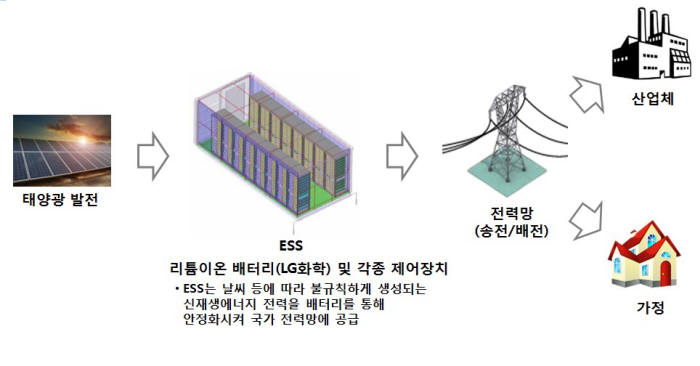LG Chem is chosen as the ESS battery supplier for Japan’s largest commercial renewable energy generating facility.
LG Chem’s batteries will be supplied to Japan’s largest commercial renewable energy generating facility to which the strictest technological standards were applied.
LG Chem announced on February 15 that it was selected as the battery supplier in the solar power plant-linked energy storage system (ESS) project of Japan’s renewable energy genco, GPD (Green Power Development Corporation), in Hokkaido, Japan. It is the first time ever that large quantities of Korean batteries are supplied to the Japanese market, the traditional strong power in batteries.

The battery capacity, which LG Chem supplies, is 31MWh, equivalent to the wattage consumed by 6000 households on a daily basis. The ESS that LG Chem supplies will be used mostly to stabilize the output of the solar energy sources that produce power irregularly according to weather and climate conditions. The produced electric power will be sent to the national power grid through the power companies in Hokkaido and supplied to general consumers. According to the contract, LG Chem will supply the lithium ion mid-to-large secondary batteries to 4 solar power plants in Hokkaido, Japan sequentially until 2017.
This order for batteries is especially meaningful in that LG Chem’s technology and price competitiveness were recognized in the competition with global companies in Japan, such as Toshiba and Panasonic. LG Chem became the first in the industry to meet the ‘1%/min rule,’ the output variation regulation set forth by the Hokkaido power authorities, and had its technology recognized.
The Hokkaido power authorities has been continuously increasing the proportion of renewable energy generation since the nuclear crisis in Japan, but has had trouble with power quality because there are too many private operators recently. Accordingly, the Hokkaido power authorities established a new standard requiring that electric power should be able to be sold only when the output variation of renewable energy can be controlled below 1% per minute. Compared to the customary practice that up to 10% variation was allowed by the conventional renewable energy generation business, it is the strictest standard in the world. As a result, LG Chem captured an advantageous position in receiving additional orders from private gencos in Kyushu or Okinawa as well as Hokkaido, Japan.
“With the technology we have accumulated in the field of secondary batteries for electric vehicles and ESS, we could beat the world’s toughest technological regulation in Japan, the powerhouse in batteries,” said Kwon Yeong-soo, head of the Battery Business Division of LG Chem. “We will become the world’s undisputed No. 1 in the ESS by making inroads into the Japanese market after the North American and European market.”